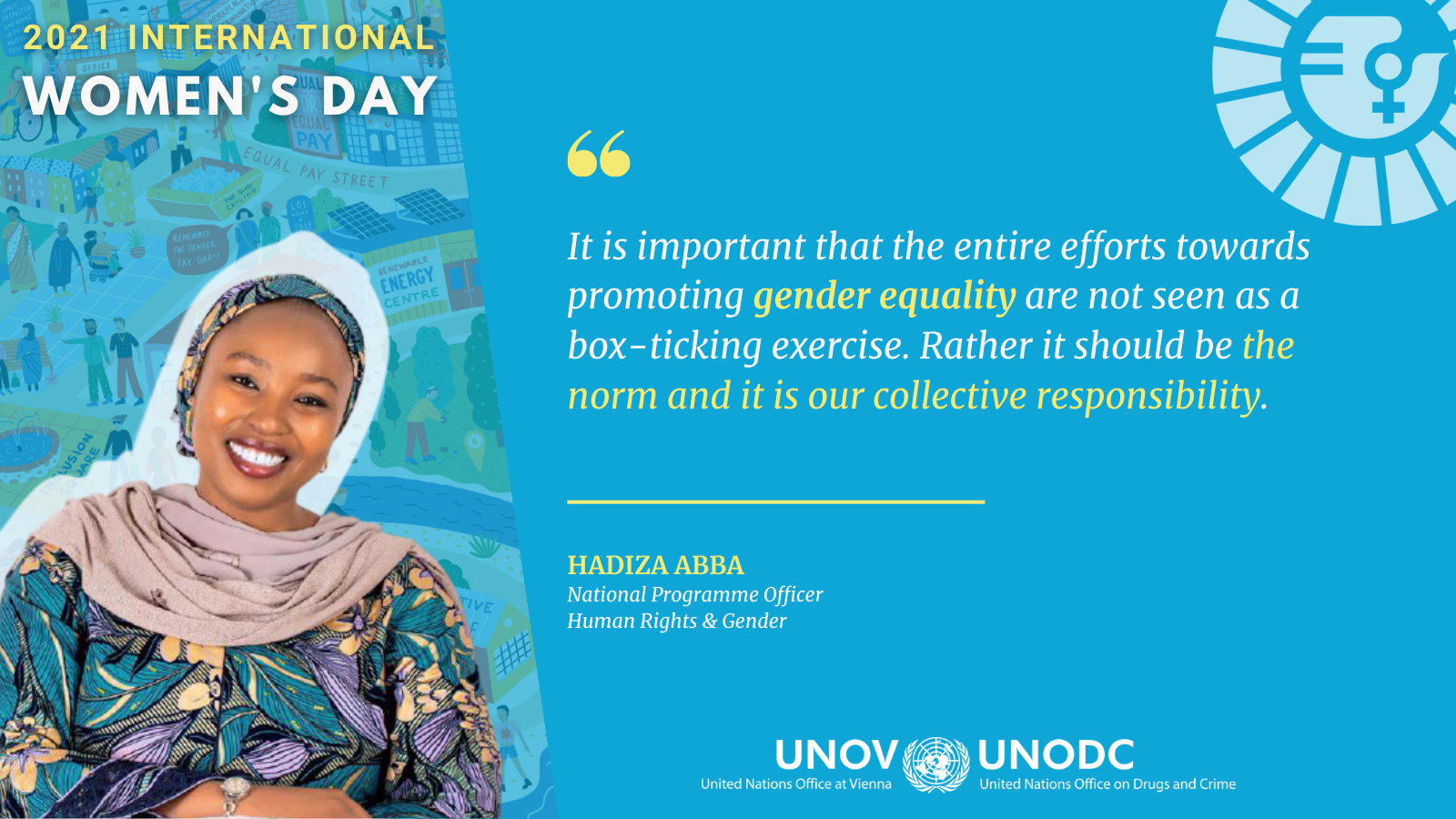
(c) UNODC
UNOV/UNODC Gender Team: What was the “a-ha” moment when you realized there was a practical reason for promoting gender equality? How is that translated in your work?
Hadiza Abba: In 2017, the year I started my role as a UN Volunteer supporting the Nigeria project on Strengthening Criminal Justice Responses to Terrorism, coincided with the adoption of the General Assembly (A/RES/72/194), that requested UNODC to assist Member States in mainstreaming gender perspectives into criminal justice responses to terrorism. Prior to that, although the project explicitly and systematically encouraged the participation of women officials in training activities, there was little consideration of the gender dimensions in interventions and how planned policies and actions impacted women and men differently. Additionally, even though women were increasingly targeted in training activities, there were very few women in operational roles or at the decision-making level that were able to drive change at the institutional level to make the desired impact. These gaps underscored the practical importance of mainstreaming gender in a more systematic manner and the UNOV/UNODC Strategy for Gender Equality and the Empowerment of Women provided the enabling basis for that.
Since then, I have supported the project’s efforts to integrate gender dimensions, not only during capacity building activities but also by organizing capacity building and train-the-trainers workshops, specifically on the gender dimensions of criminal justice responses to terrorism. This includes the development and launch of a Nigeria Training Module on Gender Dimensions of Criminal Justice Responses to Terrorism in 2019.
UNOV/UNODC Gender Team: How would you encourage other colleagues to lead the way and be actively involved in promoting gender equality?
Hadiza Abba: By encouraging them to get acquainted with UNODC gender mainstreaming structures and tools such as the UNOV/UNODC Strategy for Gender Equality and the Empowerment of Women and Action Plan to guide their day-to-day work. In particular, the Gender Briefs which have been tailored to the different mandated areas provide some great examples on how gender can be practically mainstreamed in programmatic aspects. I believe by setting the example, there is a strong likelihood that others will follow suit. It is important that all efforts towards promoting gender equality is not seen as a box-ticking exercise; rather it should be the norm and is our collective responsibility.
UNOV/UNODC Gender Team: How do you commemorate International Women´s Day, especially in light of the COVID-19 pandemic?
Hadiza Abba: The UN Women report on the pandemic highlighted the impact of COVID-19 on the increasing cases of violence against women (VAW) as a result of confinement of survivors with abusers in their homes making detection and reporting even harder, further fueling impunity for such crimes. Despite the daunting state of affairs, a proactive culture is developing in Nigeria, whereby community advocates, volunteers, police, social service providers and reporters, are working together with unprecedented coordination to implement a zero-tolerance policy to combat violence against women and girls. Global solidarity campaigns such as HeForShe and #WithHer have become crucial in engaging men and boys as important allies in the gender equality movement and to address norms and attributes that tolerate and perpetuate violence.
I intend to commemorate this year’s IWD by aligning with innovative and non-traditional efforts such as these to respond to VAW amidst the global pandemic.

(c) UN Women
Marked annually on March 8th, International Women's Day celebrates women's achievements and raises awareness about women's equality. UN Women announced this year`s theme as, “Women in leadership: Achieving an equal future in a COVID-19 world.” The theme celebrates the tremendous efforts by women and girls around the world in shaping a more equal future and recovery from the COVID-19 pandemic. It is also aligned with the priority theme of the 65th session of the Commission on the Status of Women, “Women's full and effective participation and decision-making in public life, as well as the elimination of violence, for achieving gender equality and the empowerment of all women and girls” and the flagship Generation Equality campaign.